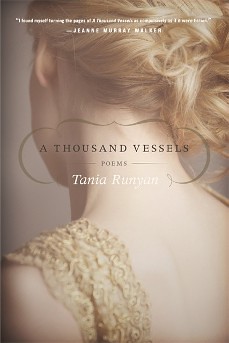Some of the most powerful stories in the Bible are about women – Eve, Sarah, Deborah, Ruth, Esther, Mary, Mary Magdalene, the woman at the well, and the woman who touched Jesus’s clothes, to mention a few of the more obvious ones. Their stories are stories of sin, disbelief, leadership, faithfulness, courage, faith and steadfastness. These stories speak to both men and women, and most likely because they are most of all human stories, things we recognize and understand.
In poetry, these stories can become our stories. That’s what poet Tania Runyan accomplishes in A Thousand Vessels: Poems – to write both poems about Biblical characters and non-Biblical characters and situations, to help see the connections to the stories in the Bible and how they apply to us. From “Beach Walk:”
I wore my leopard bikini like the mannequin
at Bullock’s: shoulders back, breasts out,
fingertips light on my hips. Dina swiveled
her buttocks in a fuchsia French-cut
that pointed like an arrow between her thighs…
Poems about Dinah (the sister of the 12 sons of Jacob) and her rape are paired with a poem about child sex offenders. Poems about the woman at the well in the gospel of St. John are paired with a poem about the sins committed by a child against another child. Poems about Esther are grouped with a poem about walking on a beach. The stories of Jairus’s daughter are matched to a poem about children who nearly die. In “Children of Near-Death, ” Runyan describes the near death of a 10-year-old named Edward:
…I dove. No more stuttering in Class. No more stinky
dodgeball courts, the cool kids lobbing
at my face. I swam deeper
a million pounds of water behind me. Kelp waved at me
like a crowd gathered in the grandstand.
Wrapped around my arms and legs
till I couldn’t get loose. Darkness…
These are not all dark poems. To the contrary, these are hopeful poems, not the least for the biblical characters represented and described. But what the addition of the non-Biblical poems does is to make the Biblical characters recognizable and contemporary – the woman who makes a terrible mistake, the woman who scoffs, the woman who assumes a leadership role, the woman who is faithful and caring even when no one expected her to be.
In that sense, A Thousand Vessels becomes a contemporary application of the Biblical stories. It’s a wonderful collection, full of faith, hope and truth.
- Poets and Poems: Beth Copeland and “I Ask the Mountain to Heal My Heart” - July 10, 2025
- A.E. Stallings: the Parthenon Marbles, Poets, and Artists - July 8, 2025
- Poets and Fables: Steven Flint and “The Sun and the Boy” - July 3, 2025

Maureen Doallas says
Looks like a fascinating collection. Thank you for spotlighting it.